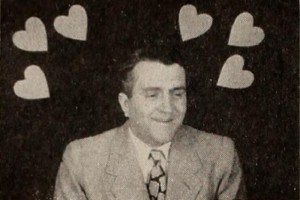
"Staria Zimmerman, that charming Milwaukee minx who made her big time bow in The Boss Comes to Dinner, a 1944 Ten Best winner, has done it again in The Dizzy Top. As the impish daughter of a winsome but widowed mother, she pulls the strings in this "merryonette" show which maneuver her pretty parent into the arms of a new and handsome husband. The quite willing victim of these arch designs is, in the film, the proprietor of a swank hat shop, and it is in this bright locale that the majority of the action takes place. Patricia and Ryne Zimmerman — the producers and supporting players — have a sharp and genuine sense of farce comedy. Their lighthearted plot dances forward as gaily as the suave settings they have contrived for it. Their incidents are antic in their absurdity, their timing crisp and delicately controlled. These qualities are, to be sure, aided immeasurably by Mistress Staria, who carries off each new comic conceit with impudent but charming assurance. Mr. Zimmerman's technical execution in their latest film leaves little to be desired in competence and imagination. There is, to a heightened degree, the same warmth and brilliance in his lighting which marked The Boss. His camera viewpoints are effective and varied, cutting one into the next with precision and pace. Show pieces of cinematic imagination enrich the production, like sugar plums in a Christmas pudding. The Dizzy Top, the Zimmerman's first 16mm. effort, is a handsome step forward along their chosen course of lighthearted comedy." Movie Makers, Dec. 1946, 486.
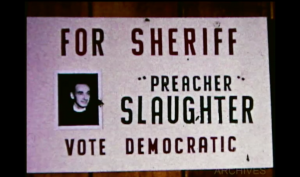
A husband and wife hold different opinions about who is to become Sheriff. The wife roots for the Democratic candidate "Preacher" Slaughter, while the husband wants to re-elect Republican candidate Sheriff Carver. Both parties bribe the husband and wife for their absentee ballot. notes from CFA
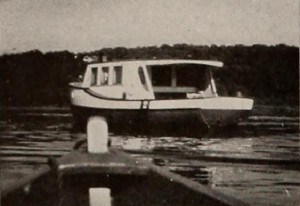
"In spite of the almost insurmountable difficulties in using feet to portray much of the action and most of the emotion in a movie, E. H. Sparks has managed to make Doghouse Blues completely comprehensible. A delightful farce of a bibulous fisherman, the story makes judicious use of the angler's big toe to denote thirst, hunger and any other emotion which might master a man on a solo weekend. Colorful scenes of inlets and bays, as well as attractive sequences of fishing craft, imbue the film with a flavor of authenticity. In satiric repetition, his indignant wife trails the tippling angler to the secluded spot where his boat rides at anchor, there to find him "taking the long count." A rude awakening for the errant husband and an eminently suitable final scene close the picture." Movie Makers, Dec. 1946, 471.
"Family scenes in a garden in Stretford. Includes footage of a woman doing a forward roll in front of the camera; interior shots of a baby being bathed and a woman sitting in the living room with a dog" (NWFA Online Database).
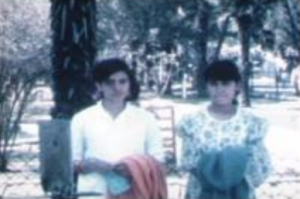
"Esta cinta se basaba en una idea de David Celestinos de enviar a diversos equipos de filmación a desarrollar historias sobre lo que ocurre un domingo en la Ciudad de México de manera simultánea. El resultado fue interesante, en la medida en la que muestra la cotidianidad dominguera de diversos personajes que provienen de distintas clases sociales: un borracho llega con su compadre a la casa de la vecindad y es recibido de mala manera por la mujer, un grupo de juniors pasa el día en Cuernavaca, un hombre solitario recorre las calles y parques del centro de la Ciudad de México, un velador se aburre en el edificio que custodia, dos sirvientas pasan el día en Chapultepec, una familia clasemediera que va a misa y a pasar un día de campo... La cinta sigue el planteamiento hecho por el neorrealismo italiano de no convocar actores profesionales para presentar historias sencillas, ligeramente dramatizadas" (Vázquez Mantecón, 2012.
"This film was based in an idea by David Celestinos of sending diverse filming crews to develop stories about what happens simultaneously on a Sunday in Mexico City. The result was interesting since it showed the Sunday everydayness of diverse characters from different social classes: a drunk man arrives at his friend's house in a poor neighborhood and is received in a bad way by a woman, a group of juniors that spend their day in Cuernavaca, a lonely man that goes through the streets and parks of Mexico City, a night watchman that is bored in the building he is in charge of, two maids that spend the day in Chapultepec, a middle class family that goes to mass and to have a picnic... The film follows the idea posed by Italian Neorealism of not using professional actors to present simple stories, slightly staged" (Vázquez Mantecón, 2012).
"Twin boys wreak havoc on a park when their dad falls asleep on their picnic." Sacramento Public Library.
"Clyde Hammond, of 65 Murdock Street, Youngstown, Ohio, won an honorable mention in the 16 millimeter division for his study of country life, 'The Dragon Fly.'Mr. Hammond worked out a strong atmospheric study of a selfish country boy, home from college, and his hard-working farmer father."Photoplay, Jun. 1928, 137
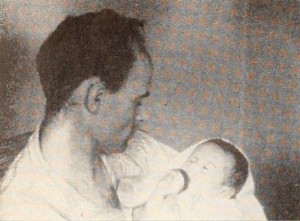
"Here, in Duck Soup, is the true life blood of amateur movie making — the family film. Since the hobby's very beginning in 1923, and consistently through the years since that time, more persons have bought more amateur movie cameras to take family films than for all other reasons put together. And yet look at the results! Or better still, don't look at them — for they are on the average an incoherent hodgepodge of over and underexposure, unsteady camera handling and wild panning on disconnected mementos of familiar milestones. Duck Soup, for those filmers who are lucky enough to see it, should change all that. For here is a well planned and crisply executed family film which has a beginning, a middle and an end. It has also precise camera work, fluid sequencing, and lighting on the children which will delight the heart of all home filmers. Do not, however, let these disciplined excellencies mislead you. For, above all else, Duck Soup is no stodgy exercise in family record keeping. These people had fun! Look . . . Duck Soup is a rollicking, rambunctious saga of what happens in a household when Pop, charging recklessly that the trials of homekeeping are "duck soup," is deserted for a few days by his deserving wife. What happens, as Pop gets the works from a quintet of utterly engaging youngsters, shouldn't happen (as they say) to a dog. There is stolid, well-meaning Tim, who, returning from the corner store, mangles a loaf of bread beyond all human use; there is demure and lovely Ellen, who plays the bride with Mom's best lace tablecloth; there are Greg and Kevin, impish and angelic twins, who roughhouse their way through the afternoon nap, bathing, haircuts and countless other high-spirited adventures. And there is, finally, Gary, the baby, who bawls like a foghorn and is Pop's particular problem-of-the-day. Duck Soup, in recounting these hilarious misadventures, is not a "great" film in the majestic sense of the word. (Majesty would be impossible in the face of that Lawler brood!) But it is family filming of the finest sort. It is warm, winning and alive with good spirits. Duck Soup is the best of the Ten Best for 1952 — and it richly deserves the Maxim Memorial Award which it has won." Movie Makers, 1952, 323-324.
"Structurally sustained by only the slimmest of plot incidents, Dummy Walks Out is in essence an etude in cinematics, sparkling with brilliant photography and bravura with striking angles. An evening of bridge, consistently bad cards to one player and, in time, the dummy walks out — such is the simple scheme of this masterpiece in miniature. Throughout its brief footage, however, the producers, M. P. Gamber. ACL, and Walter Mills, ACL, have contrived a gleaming glossary of cinematic imagination which delights the eye and beggars analysis. Near shot, closeup and extreme closeup (in several scenes, a single playing card fills the entire screen) follow one another with graphic beauty. Dummy Walks Out is a brilliant answer to the timid souls who "alibi" that the Eights can't take it." Movie Makers, Dec. 1935, 534, 550.
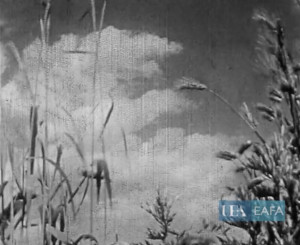
"Eastman Kodak Company prize for the finest example of photography in any out-of-door picture whether it wins a cash prize or not was awarded to Tatsuichi Okamoto, Maysuyama, Japan, for 'Early Summer,' 1 reel. This is a different subject than the one which won him second prize." American Cinematographer, Jan. 1933, 25.
Total Pages: 39